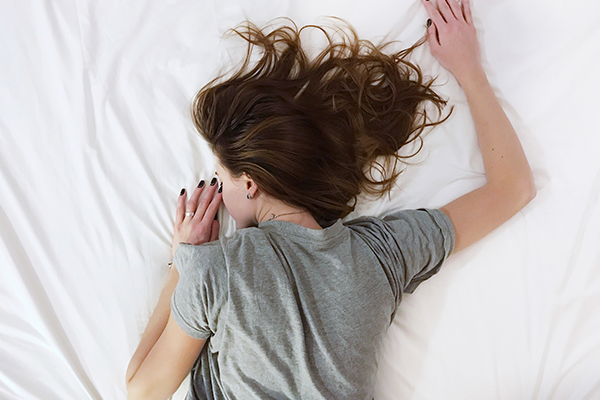You probably already know what it’s like to run on very little sleep. 1 in 3 Americans don’t get enough!
Thinking clearly becomes difficult when you’re sleep-deprived. Your attention, reasoning, and problem-solving skills will all diminish, which means you’ll not only be less productive at work, but also seriously struggle to get through the day.
Your reflexes also lose their edge when you lose sleep. You may start dropping things or become a little clumsier. Scary fact: you’re more likely to be involved in a car accident when you’re running on too little sleep (1).
And that’s just what you’re dealing with on the surface.
Internally, lack of sleep is wreaking even worse havoc!
That’s why we wanted to dive into what’s really happening to your health when you short your shut-eye. It’s not pretty… so we’re also going to help you find the best natural ways to achieve a night of deep sleep, including a step-by-step guide of things to do and things to avoid.
What Lack of Sleep is Really Doing to Your Health
Dr. Michael Twervy of the National Institutes of Health says, “Sleep affects almost every tissue in our bodies (1).”
It’s connected to everything from your breathing, blood pressure, appetite, and weight control to your cardiovascular health, growth and stress hormones, and even your immune system.
How much sleep you get can also impact your mood and relationships with others. Sleep-deprived people generally have short tempers and are quick to react. Over time this can lead to an increased risk of depression.
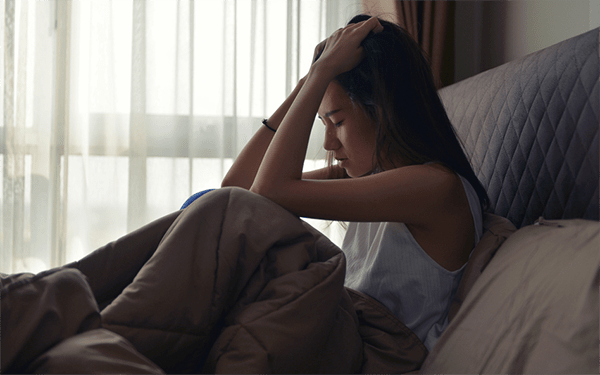
It also creates similar diabetic-like energy swings in normally-healthy individuals (1). This can cause you to crave quick-energy fixes like carbs and sugar over healthy foods like protein and veggies. And that means setting yourself up for an unhealthy cycle which may lead to weight gain and an out-of-control appetite.
So while you may feel like a walking zombie without sleep, you’re actually putting your body through a great deal more stress than you even realize.
That’s why it’s time to take your sleep more seriously.
First up: we’ll teach you the basics of sleep hygiene. Then, keep reading to learn some unique natural ways to get a better night’s sleep and help you feel like your best self.
Have These 6 Sleep Basics Down, at a Minimum
You should aim for between seven and nine hours of quality, deep sleep each night.
If you haven’t given your sleep much attention, there are a few basic, foundational steps you should incorporate into your daily routine to meet this goal.
Use these six tips as your starting point:
1. Commit to a Regular Sleep Schedule — and Stick To It!
Sticking to a consistent sleep schedule — one where you wake up and go to bed at the same time every day, including weekends — is essential to getting into a deep sleep each night.
This allows your body to easily sync with its natural circadian rhythm, which helps you complete the four to five sleep cycles your body needs to recharge and achieve deep sleep (1).
Rather than staying up late on the weekends only to wake up at the same time you normally do, or worse, wasting more than half your weekend sleeping in, start creating a consistent sleep schedule and don’t be tempted to break it.

The first few days will be the hardest. But after you get used to your new routine and start waking up more refreshed, you won’t want to stay up any later and throw it all off.
2. Avoid These 3 Activities 2-3 Hours Before Bed
You shouldn’t eat, drink, or exercise within two or three hours of bedtime.
Do these and you’ll not only struggle to fall asleep, but you’ll also wake up feeling anything but refreshed.
Basically, you shouldn’t give your body fuel (i.e., calories from food or energy from a workout) while also simultaneously asking it to wind it down for sleep. Makes sense, right?
So avoid eating too close to bed, especially high-carb and sugar-packed foods, and steer clear of caffeine and alcohol if you’re having trouble hitting the hay.
Contrary to people believing a nightcap helps them snooze, alcohol can lead to disrupted sleep and poor quality sleep. Ever noticed that you feel groggier the morning after having even just one drink? That’s why.
You’ll also want to consider moving your exercise from PM to AM. Though a post-commute workout may combat stress, the burst of energy it’ll give you would be better directed to your mornings, when you really need it.
Just don’t skip the exercise altogether! Numerous studies confirm how beneficial exercise is for helping chronic insomniacs fall asleep faster, stay asleep longer, and improve their quality of sleep (2).
3. Spend at Least 15 Minutes Per Day Outdoors
Getting enough sunlight in your day is one of the best natural ways to achieve a night of deep, restful sleep.

By spending time in the sun, you’re sending your brain a signal that it’s daytime. As the incredibly powerful machine that it is, your body then makes adjustments in hormones and other important signaling later (3).
When it becomes nighttime, your body releases melatonin, a key hormone that tells it to prepare for sleep. This rise in your melatonin levels is why you start to feel so groggy and sleepy just before bed (3).
However, if you’re around artificial lights late in the evening — let’s say in the gym, at your office, or via your favorite devices — you’ll throw off this natural signaling mechanism and may confuse your body into thinking it’s still daytime.
This could be why you’re so wired before bed and have trouble winding down. To combat the issue, try to get 15 minutes of sun exposure each day and avoid too many artificial lights (and screens) before bed.
4. Skip the Screens Two Hours Before Bed
It’s super tempting to send off one more email or watch just one more episode as you’re laying in bed. But do this one to two hours before your bedtime and you’ll be jeopardizing your sleep as well as your productivity and focus the next day.
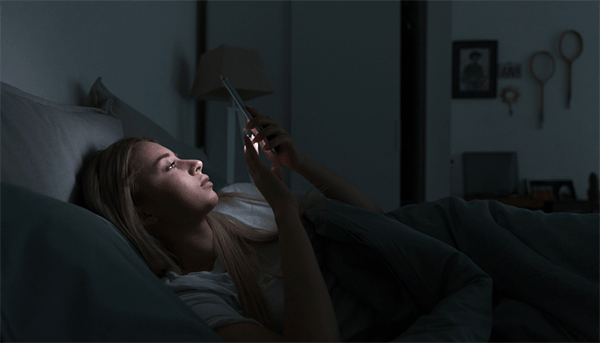
Weird as it may seem, the blue light emitted from your screens — such as from TVs, computers, phones, and tablets — really does make it harder for your brain to turn off and wind down (3). This then establishes a vicious cycle of staying up late and losing productivity the next day.
Just like you wouldn’t give children a video game before bedtime, it pays to hear this advice as an adult too. Give yourself a set time to stop looking at screens for the day. Ideally, this should happen one to two hours before you’re ready to sleep.
Before this time, make sure to put your device in “Night Shift” mode (for iOS users) or “Night Light” mode (for Android users). This will tone down the blue light and emits a warmer shade to get your brain ready to wind down.
5. Create the Right Sleep Environment
Before going to bed tonight, take a good look at the environment you’ll be surrounded in for the next eight hours.
Is your room completely dark? Or are there street lights poking through your blinds? Can you hear the neighbors or the goings on of a busy street outside your window?
If you’ve been living there long enough, chances are you may no longer notice these distractions and sleep disturbances. So while you may think you’ve trained yourself to tune these things out, your subconscious may beg to differ.
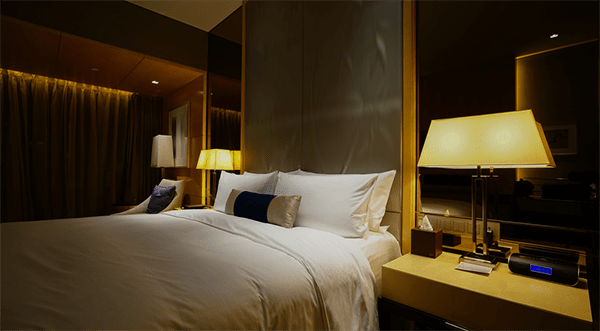
Creating the right sleep environment requires three things:
Darkness
Your body relies on natural cues about sleeping and waking from light sources like the sun and moon. But if your body is constantly subjected to artificial light sources, such as from a night light or street light, it may have trouble regulating a proper sleep cycle.
To avoid this, adjust your sleep environment so it’s as dark as possible before and during your sleep cycle. Use heavy blackout curtains to shield your windows and an eye mask to block out internal sources of light.
Choose this route and you may also want to get one of those alarm clocks with a light that simulates sunrise and sunset (since your body won’t be able to see when the sun actually does this).
Quiet
Sounds from muffled conversations or traffic will only be a distraction before bedtime. You can try using a white noise machine to drown out distinct sounds and hypnotize your ears to sleep.
Earplugs also work great — for a fraction of the price!
Temperature Control
The temperature of your bedroom can also make a huge difference in your sleep quality. Your bedroom shouldn’t be too hot or too chilly as either extreme will cause it to stress and become uncomfortable.
Depending on your preferences, make sure to wear socks or have a fan running so you don’t wake up in the middle of the night to correct your body temperature.
It can be harder to find the right temperature if you sleep with a partner. You might want to consider using temperature-controlled blankets that allow you to adjust each individual side separately. This option is great since you can change the temperature with just a click of a button, without affecting your partner’s sleep.
6. Ditch Any Naps Longer than 20 Minutes
Unless you’re sick and your body needs to recharge, naps during the day will make it harder to snag quality deep sleep at night.
Any nap longer than 20 minutes puts you into a deep sleep state. This means if you’re woken up and interrupted mid-way, you’ll feel more groggy than before you started napping.
If you absolutely must take a nap, cap it at 20 minutes and do so no later than four to five hours before bedtime. This way you’ll catch a few winks without ruining your chances of sleeping through the night.
7 Deep Sleep Tips You May Not Have Tried Yet
Have you mastered the foundational basics of sleep hygiene but still want better, higher-quality sleep?
It’s time to try these natural sleep remedies:
1. Use a Bedtime Ritual That Starts on Schedule
Just like your alarm clock wakes you up each morning, you should have a set time to sleep too. This helps your body create a natural rhythm and helps it understand when it’s “go” time and when it’s time to wind down.
You can take this a step further and calculate not only your bedtime but also the time you need to start the power-down process.
If you wake up at 5 am, for example, and you’re shooting for at least eight hours of sleep, you would need to start your ritual around 8:30 pm — assuming it takes about 30 minutes to get ready for bed.
This gives you an easy schedule to start with and helps you lock in the right amount of sleep each night. Do the math to figure out when you need to be in bed and start making this a non-negotiable so you can sleep better.
Creating a relaxing bedtime ritual also helps you look forward to settling in. Make a soothing cup of tea, or use essential oils like lavender or bergamot in your room or in a warm bath and you’ll have a comforting oasis you can’t wait to go to.
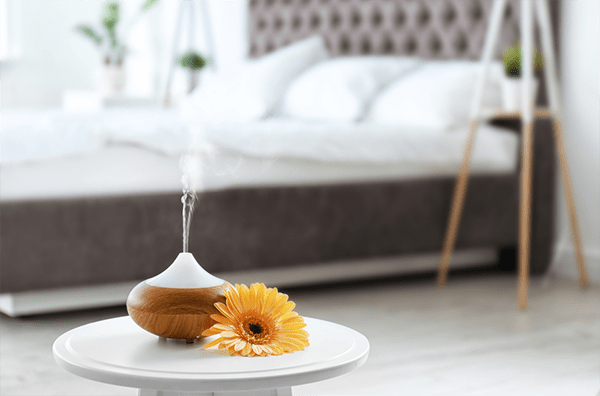
A schedule will also give you more time to enjoy this de-stressing part of the day. If you start your sleep ritual too late it won’t feel as enjoyable and may be rushed.
2. Get Ready For Bed As Soon as You Finish Dinner
Pro tip: Brush your teeth immediately after you eat dinner and you’ll be less tempted to eat seconds or a dessert since you’ve already cleaned up! This can also be the perfect time to wash your face and change into your pajamas, so the only thing left to do before bed is actually climb in.
If you’re someone who ends up feeling too tired to do anything just before bed, this tip will be a game-changer. It doesn’t mean you have to go to bed right after dinner, but it helps you start the process before you’re too exhausted to do so.
This type of sleep ritual should replace the habit of falling asleep on the couch, waking up in the middle of your sleep cycle, and finding it impossible to get back on track.
3. Ditch the Stimulants
Caffeinated drinks, chocolate, and over-the-counter pain relievers that contain caffeine should be avoided at least four to six hours before bedtime.
While it may seem obvious, many people unknowingly turn to small desserts like dark chocolate squares after dinner without realizing it could be the reason they’re wired at night. It’s not just the sugar but also the caffeine.
Another stimulant you might not be aware of is the notifications from your devices.
Do you put your phone on silent? Great! But it might still vibrate or light up on your nightstand every time a notification rolls through. No wonder your sleep is disrupted! Turn your phone to airplane mode to ensure you’re also shutting off the vibrations and noise at night.
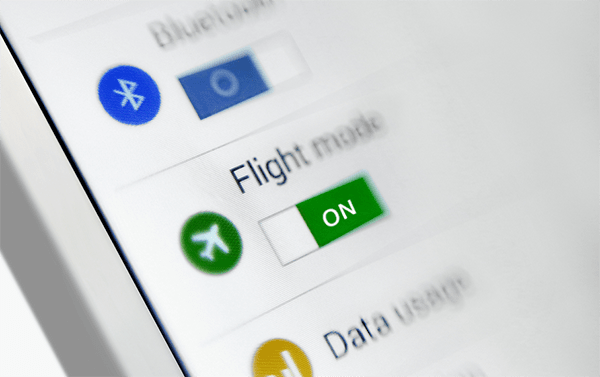
4. Try Photobiomodulation or Red Light Therapy
Red light therapy, or photobiomodulation, is a natural way to recharge your cells. Emerging studies show it can help improve your sleep by giving you a smoother transition into dreamland (4).
Rather than keep you up at night like the blue light from your screens, red light helps calm your body and facilitates that switch to deep sleep. You can find companies online selling devices that make it easy to use red light therapy at-home or on-the-go.
Many gyms and fitness studios have red light therapy machines as part of their premium membership. You could use their machine after dinner to help you switch gears after a hectic day, and it can even help your body naturally produce more melatonin.
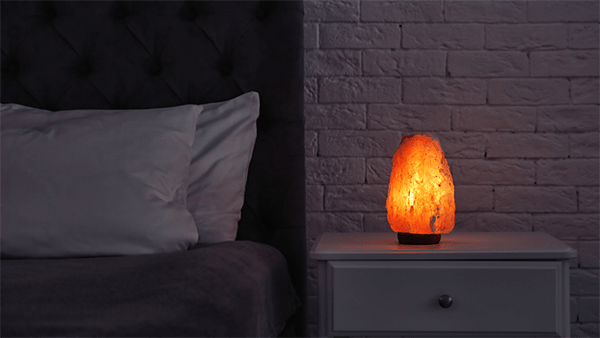
5. Supplement with Melatonin
You’ll find melatonin, a hormone that helps regulate your sleep and wake cycles, in the form of natural supplements and tinctures.
While it’s not something you should rely on every night, it can be helpful for transitions such as seasonal time changes, when you’re traveling or switching time zones, or when you’re struggling with a minor case of insomnia.
We highly recommend using a sublingual (under the tongue) version, as it’ll bypass your digestive tract and quickly get absorbed into your bloodstream. A few drops under your tongue may be enough to get you into a deep sleep until your body adjusts and is able to fall asleep on its own.
Also, you’ll want to make sure you are already in a dark room when you take your melatonin, and shut your eyes immediately after taking it (no more screens!). Any light will counteract the effects of the melatonin, and it will be wasted.
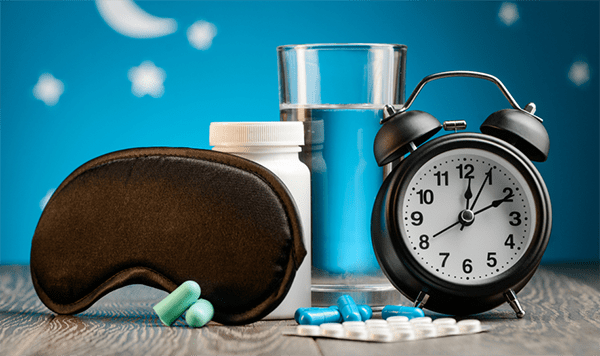
Before supplementing with melatonin, please be sure to check for any potential interactions with your prescription medications.
6. Practice T’ai Chi Chih, Yoga, and Meditation Before Bed
The practice of T’ai Chi Chih, a series of meditative movements, has been shown to be an effective natural solution for improving sleep quality in adults, according to one study (5).
Another body of research also found yoga to be just as beneficial for adults who already suffer from insomnia (6).
Several other studies on meditation, especially a form called medicinal breathwork, have also shown that it can positively impact sleep (7)(8).
And it does this on several levels (7)(8):
- People who meditated lingered in slow wave sleep longer (deep sleep phase, non-rapid eye movement) than those who didn’t
- Meditation also strengthened REM (rapid eye movement) sleep, which is another deep phase that often leads to vivid, life-like dreams
- It could also help older people achieve a similar sleep quality to younger ones, something that’s often disrupted as people age
- Meditation also helps to improve melatonin levels
- A smaller study found that it can help to combat fatigue, insomnia, and depression in as little as six weeks
But you don’t have to wait for a problem with your sleep to surface before you start practicing these stress-reducing activities. By adopting a regular T’ai Chi Chih, yoga, and meditation practice, you can improve your sleep before you become anxious or sleep-deprived.
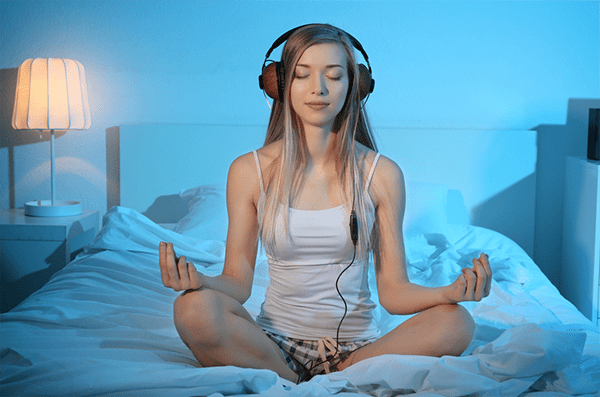
Look for instructors locally or find videos you can stream online. Just be sure to do so using night mode on your devices and don’t practice too close to bedtime.
7. Don’t Forget About These Items Either
Using the wrong sheets may contribute to overheating or being too cold while you sleep. That’s why it pays to find the right fabrics for your bed sheets instead of only looking at the aesthetics or price of your set. Many people find bamboo to very comfortable for helping to regulate body temperature. Flannel should be avoided unless you live in a very cold climate or have consistently low body temperature.
Another important point to consider is the age of your mattress. If you’ve clocked more than eight years of sleep on yours, it’s time to upgrade for a better model with new, firm support. Once you bring home your new mattress, you might want to set a reminder on your phone to track your mattress age moving forward.
Once you tackle those steps, you can move on to ensuring that your bedroom is free of clutter. Little piles of clothes and stacks of mail creeping up to the ceiling are not conducive to a good night’s sleep, even if your mattress is new and your sheets are made of breathable fabric. Your brain will constantly feel overwhelmed.
Some other items that fall under the clutter category include having a TV, office computer and desk setup, or workout equipment near your bed. Anything considered non-essential should be moved to another room so that you can keep your bedroom as your sleep sanctuary where only two things happen: sleep and intimacy.
Final Thoughts
We hope you now have plenty of ideas to run with on your quest for better sleep. The next steps are up to you!
Start by nailing down the easy sleep basics in the first section. Try each step one at a time and make sure to master it completely before moving on to the next. Remember, you don’t want to change too many variables at once. You may have trouble juggling them all or figuring out which ones actually help your sleep quality the most.
Keep up your bedtime hygiene long enough and you’ll be well on your way to a deeper sleep in no time.
